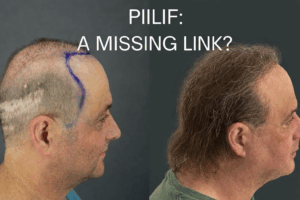Dr. UGraft Nape Hair Hairline Restoration Surgery Provides Lasting Results For Venice Beach Patient: This patient’s hair loss in his widow’s peak made him look like “a vampire.” Slight balding at the temple regions had left him with an uneven and angular hairline that came to a point in the middle of his forehead. The misshapen hairline caused him to feel embarrassment due to it’s resemblance to Mickey Mouse or a vampire. Fed up with the teasing, the patient sought out help from Dr. Umar and his advanced Dr.UGraft method for a highly individualized FUE hairline surgery.
Correction of A Sharp Widow’s Peak Through Follicular Unit Extraction — Before and After Video
Read about the publication of Dr U’s groundbreaking work on the use of fine nape hair in the crafting of softer more natural hairlines by the esteemed Aesthe…
Hairline Restoration Surgery – Patient’s Before Photos:
Dr. Umar devised a plan to perform a hairline reconstruction to not only reverse the signs of hair loss but also to create a flattering, youthful end result. With the proper measurement of the patient’s head and existing hairline, the doctor decided on the right quantity and caliber of grafts to use. The transplanted hair would create a softer, more natural-looking hairline that better accentuated the patient’s facial features and skeletal structure.
The image below shows the hairline before his hair restoration treatment.
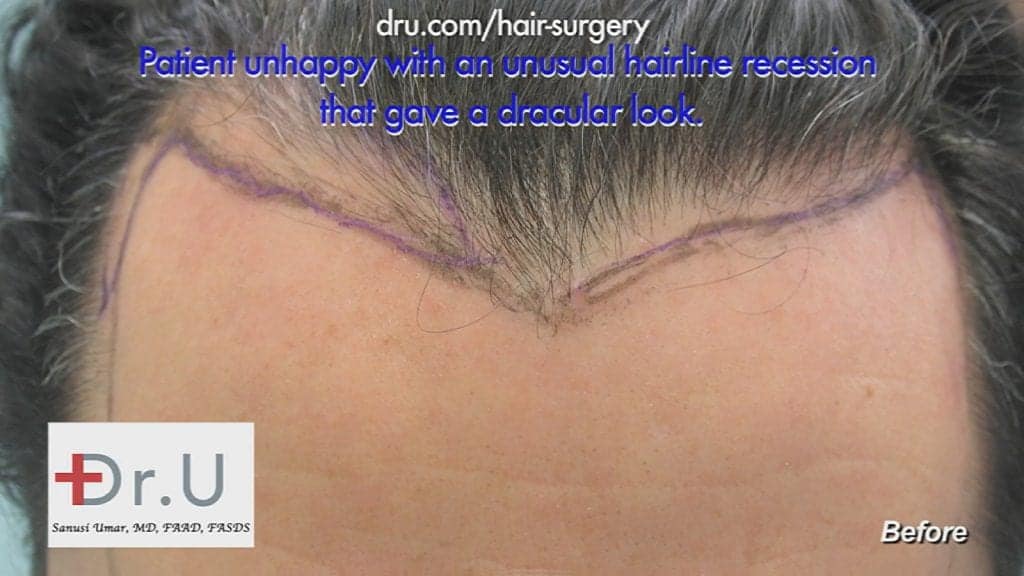

FUE Hairline Reconstruction – Dr.UGraft™ Procedure Photos
Dr. Umar decided to use 600 Dr.UGrafts transplanted from the nape of the patient’s neck to adjust the hairline. The natural softness of nape hair makes it unique in rendering the subtle soft edge necessary for the best hairline restoration surgery results.
Conventional transplants that utilize coarse hairs from the middle of the back of the head, often impart a harsh looking hairline. Dr. U’s ability to harness finer hairs from the nape area allows for the creation of more seamless and undetectable hairlines because of their naturalness.
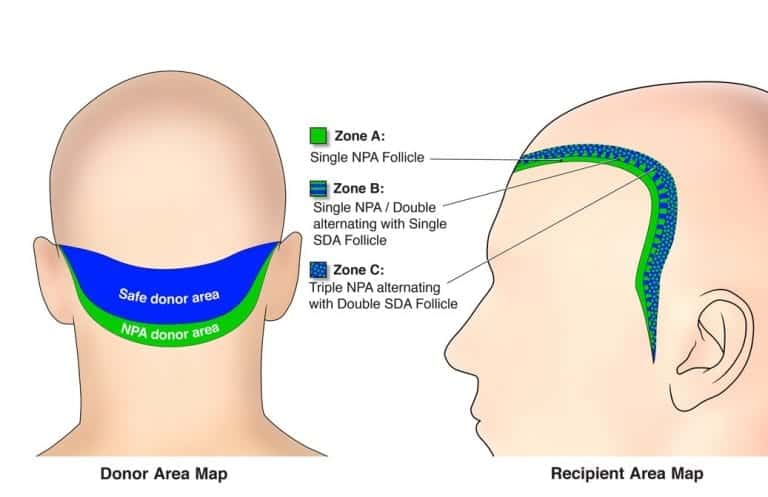
Dr. U is the pioneer of the utilization of nape hair in creating soft hairlines and temples and has published his work in the Aesthetic Surgery Journal.
He developed a method known as the FUE Shave Test to determine which patients can benefit from the use of nape hair with the certainty that it will last long term. By shaving a patient’s head and analyzing the density of hair in the nape area, it can be relatively easy to see whether or not these follicles are likely to survive long-term in the recipient area. Normal, high density with no clear area of demarcation in transitioning from the back of the head to the nape area regions indicate good candidacy. Evidence of sharp line of demarcation between these areas and thinning and low density in the nape area indicates that nape hair should not be harvested.
This particular patient turned out to be an excellent candidate for nape hair extractions to best achieve his hairline restoration surgery results.
Dr.UGraft Advanced FUE Hairline Restoration Using Nape Hair For Unparalleled Softness and Natural Looking Appearance – Before and After Photos
Dr. Umar decided to use 600 Dr.UGrafts transplanted from the nape of the patient’s neck to adjust the hairline. The natural softness of nape hair makes it unique in rendering the subtle soft edge of the hairline.
Conventional transplants that utilize coarse hairs from the middle of the back of the head, often impart a harsh looking hairline. Dr. U’s ability to harness finer hairs from the nape area allows for the creation of more seamless and undetectable hairlines because of their naturalness.
With a 600 donor graft count, Dr.U was able to restore the hairline in only a single surgical session. The transplanted nape hair, however, would radically alter the shape of the patient’s hairline, creating a softer, fuller, more natural look.
The photos below show the dramatic difference.
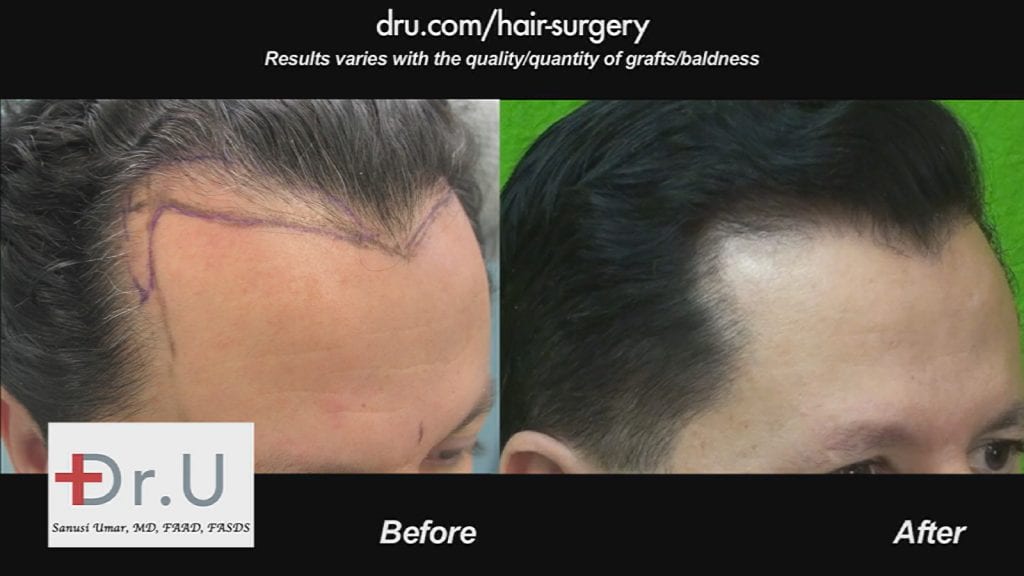

As the patient stated in his video (below), he “no longer looks like a deformed vampire”. His newly reshaped hairline revamped his appearance, helping him look like a greatly improved version of himself, especially with the classic hairstyle he chose for himself.
Even better, the patient reported feeling and looking younger, as the teasing from friends about his hair had ceased. Four years after his surgery, the patient’s transplanted hair continued to grow in the previously recessed areas, thus proving the long-lasting results of Dr.UGraft FUE. Also, the patient reported feeling ecstatic about his outcome, feeling that he looks even younger than he did ten years ago!
In the photo below, Dr. Umar combs the patient’s hair to highlight its natural look.

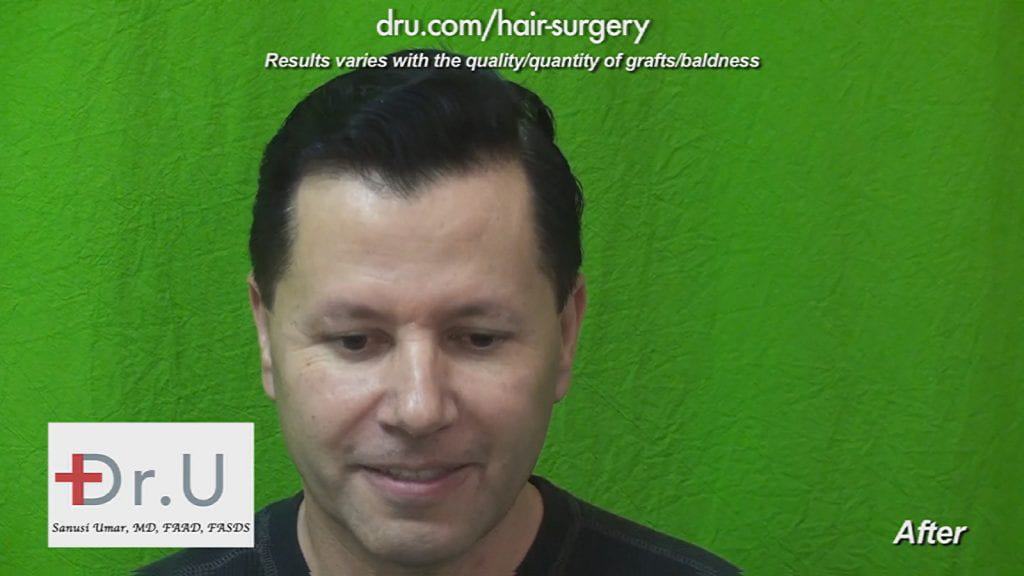
Results Video: FUE Hairline Reconstruction Transforms Venice Beach, Los Angeles Patient’s Appearance
Watch this patient’s video as he describes his experience and feedback on reversing his widow’s peak hairline recession.
Frequently Asked Questions: Hairline Restoration Surgery
What does hairline restoration cost using Dr.UGraft advanced FUE technology?
Cost varies from case to case depending on the number of grafts needed to restore hair. Patients under financial constraints can consult with Dr. Umar to develop a hairline reconstruction treatment plan that will minimize cost while still providing the best coverage.
What are the indications for using nape hair for hairline restoration surgery?
The first step is to determine if the person is a good candidate for the use of nape hair in transplantation. If not screened properly, you risk transplanting impermanent hair that would be lost later in life. Dr. Umar described and published for the first time a method for selecting good candidates called the “FUE Shave Test.” The FUE Shave test was described fully in his Aesthetic Surgery Journal Publication, whereby, the back and sides of the head is shaved to a crew. In good candidates, for use of nape hair, there is no clearly delineated line of demarcation between the hair density in the mid portions and the nape area. In poor candidates, there is a clear line of demarcation.
Once a patient is determined to be a good candidate, nearly everyone qualifies in having the nape hair used in the very front two to three rows of hairs in the hairline and temples. This is especially useful in people that have undergone prior hairline transplants that resulted in a pluggy look, as well as Asian patients whose hair caliber is the thickest and tend to develop coarse (harsh looking) hairlines after conventional transplants.
When people type in the query, “how to stop receding hairline,” are hair transplants the only type of method that would appear in search results?
There are many approaches being sold to hair loss sufferers aimed at stopping the hairline recession. However, hair transplantation would be the only reliable approach to actually see concrete growth and results, like the patient shown here.
Interested in learning more? Our Ask Dr. U online portal allows you to ask the doctor himself. You can access it by clicking the button below:

